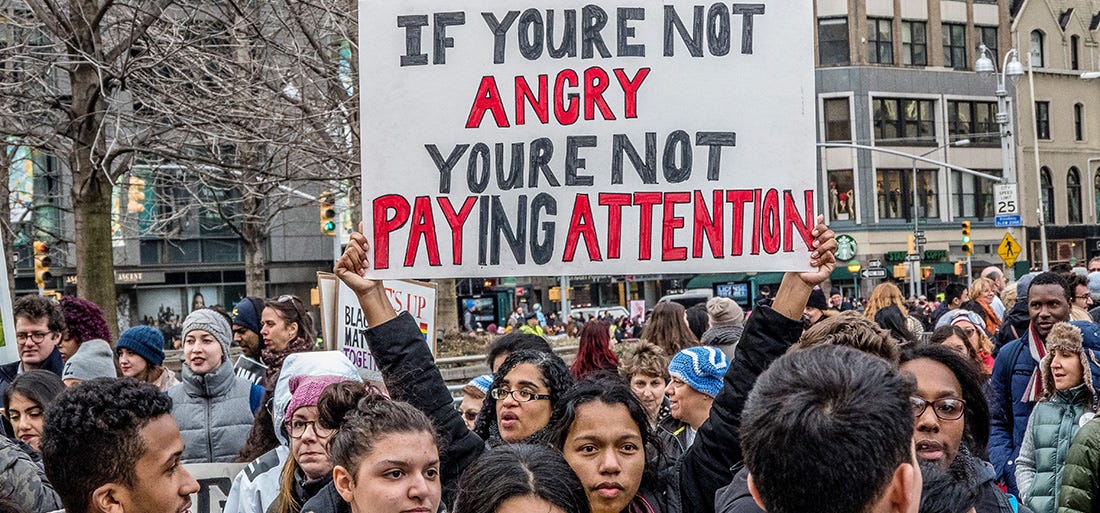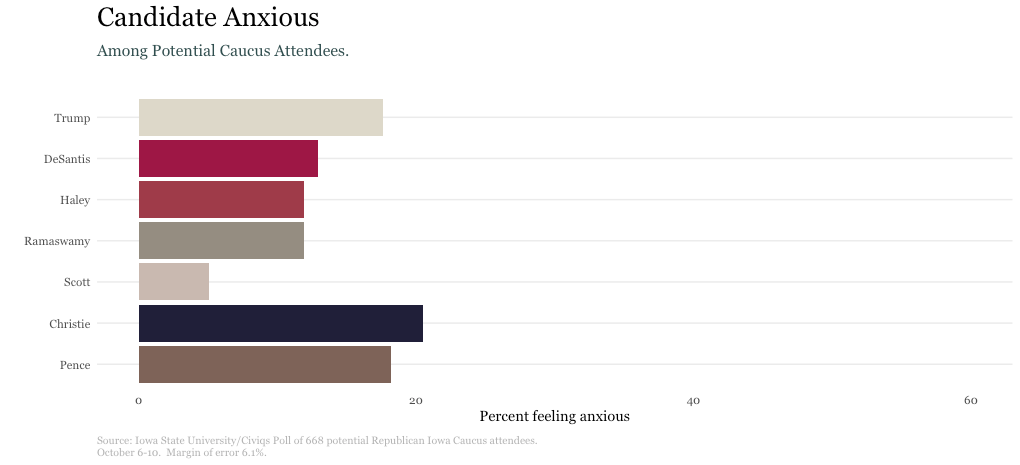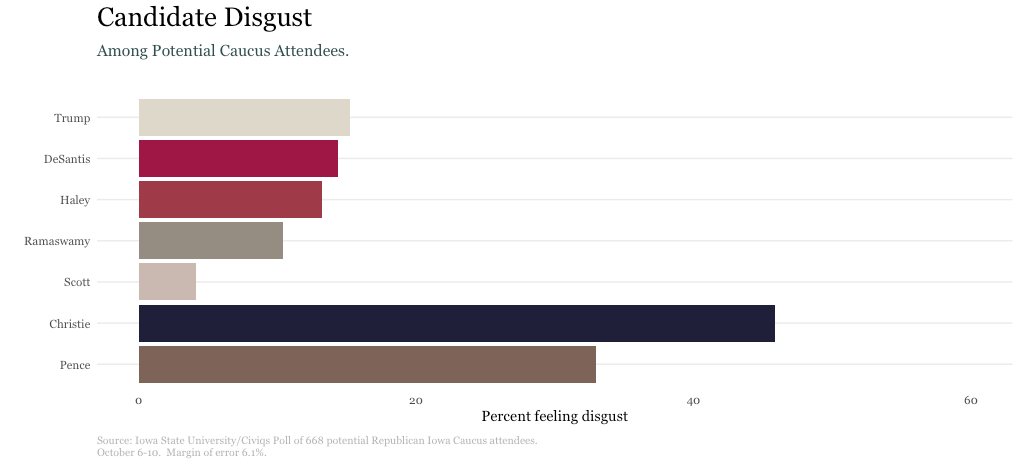Candidates got them feeling emotions
A special report from the Iowa State University team on the emotions Iowans associate with the Republican candidates
“You’ve got me feeling emotions
Deeper than I’ve ever dreamed of
You’ve got me feeling emotions
Higher than the heavens above”
-Mariah Carey, “Emotions” (1991)
Polling for the 2024 Iowa Caucuses has been uneventful so far. The horserace numbers haven’t changed much (at least compared to the Democrats in 2020) and former President Trump’s lead looks insurmountable. Iowa caucusgoers tend to be favorable towards the top tier of candidates like Trump, DeSantis, and Haley, but they are consistently opposed to Christie and Pence.
Underneath these topline numbers, however, there is a lot to learn about the state of the race and what Iowa Republicans are feeling about the candidates. Even with the stability in the poll numbers and Donald Trump’s sizable lead, the emotional reactions that voters are having to the specific Republican candidates can provide some guidance about why they are supporting or opposing the candidates they are, why the race is so stable, and the potential for how the race may change in the next few months.
The 2024 Republican Caucuses and the subsequent presidential election are particularly emotionally charged. Politics in general has become more affective – turning on emotions and feelings – as America has polarized. Americans increasingly feel very negative emotions about the other party and, to a lesser degree, strong positive emotions towards their in-party.
How emotions matter to voters
For our study, rather than just focus on vague positive and negative emotional reactions, we chose to explore what specific emotions are likely caucusgoers feel and about which candidates. We measure four different and discrete emotions: anger, anxiety, disgust, and enthusiasm.
While there are similarities to these discrete emotions, they affect politics in different ways. Anger, for instance, serves to mobilize voters; voters blame the target of the anger for the emotion and it gives them a psychological push to be more involved. But anger also tends to come with a sense of certainty—we know who we are angry at and why. This leads voters to be less receptive to new information.
Anxiety is closer to a feeling of fear. When voters feel threatened, it raises their anxiety levels, which leads people to try to find a way to mitigate that feeling. This can lead to more information seeking and lessen their reliance on their usual set of criteria for evaluating candidates. In 2016, for instance, Republicans’ atittudes about race were less correlated with support for Trump in the primary if Iowans were more anxious about Trump. Anxiety changed how Iowans put the pieces of their beliefs together when thinking about Trump as a possible nominee.
Disgust is the third “negative” emotion in this list, but we respond very differently to these feelings. Instead of leading people to act up to punish the source of the anger or seek out information to understand the cause of the anxiety, disgust leads people to pull back and actively avoid the cause of the disgust.
Enthusiasm is a more positive emotion. When we feel enthusiastic, we are more likely to participate and, in this case, plan on caucusing in January. Enthusiasm also tends to reinforce our pre-existing decisions. We don’t seek out new information because feeling enthusiastic convinces a person that they are on the right track.
Measuring emotions
To understand how Iowans are feeling about the Republican presidential candidates and what emotions they’re associating with them, we partnered with Civiqs to survey 1,016 potential Iowa Republican caucusgoers on October 6-10.
The figure below shows the percent of our respondents who associated enthusiasm with each of the major candidates. Not surprisingly, these match up closely with measures of candidate support. Enthusiasm for Donald Trump was highest among respondents. Desantis has the second most enthusiasm, followed by Haley, Ramaswamy, and Scott. Other than Trump, those other candidates all had more respondents say they were enthusiastic than were supporting them. Christie and Pence had very little support in our survey and it looks like very few of the respondents feel enthusiastic about them.
Enthusiasm is an emotion that triggers a foundational reaction in the human brain. Enthusiasm is often garnered by incentive, ration, or positive reinforcement. When we feel enthusiasm, we are more likely to act and less likely to change. The high levels of enthusiasm for Trump start to suggest why his support has been so consistent.
Christie and Pence (who left the race in late October) received the strongest anger responses among likely voters. Registered Republicans are likely feeling scorned and upset by the two candidates’ separation from and hostility toward Trump. These two candidates garnered outsized reactions to their actions within the Republican party.
Interestingly, more respondents reported feelings of anger toward DeSantis and Haley than toward Trump, which is a rather perplexing figure considering the infamy of Trump’s presidential and post-presidential controversies. The data suggests that Trump does not stir up anger among Republicans, considering the broad scope.
The significant takeaway from measuring anxiety is that respondents feel lower levels of anxiety surrounding the Republican candidates than they do enthusiasm, anger, and disgust. The minimal reaction of anxiety may suggest that voters are prepared to support their desired candidate. Anxiety manifests in a mobilizing way; making voters anxious about other candidates will push them to seek out new or different information on the election in general. Considering that DeSantis and Haley received lukewarm anxiety responses, it could be in their best interests to stir up anxiety among voter bases toward other candidates - particularly Trump.
Finally, the figure below shows the percent of respondents who associated disgust with each of the candidates. It is perhaps little surprise that Republican voters show an outsized reaction of disgust toward Christie and Pence. These were the two candidates saying the most negative things about Trump, and many Trump supporters feel betrayed by them.
When people feel disgusted by a candidate, they will not support them. It could be a stealthy campaign tactic for candidates like DeSantis, Haley, and Ramaswamy to breed a sense of disgust directed at their competitors to stimulate the other effect of mobilization.
What this means going forward
Given the emotional reactions to the candidates, it is no wonder that there has been so little change in the polls. Iowa potential caucusgoers are largely enthusiastic about Trump and do not feel many negative emotions about him. They like him and, for most Iowa potential caucusgoers, they don’t feel much reason to even think about other candidates. The low levels of anxiety relative to the other emotions mean that our respondents are not inclined to seek out new information or rethink their choices.
The emotional reactions to the candidates illustrate the dilemma facing Trump’s challengers. They need to convince at least some of his supporters to back them instead of Trump. The supporters’ high levels of enthusiasm, however, means that they are unlikely to rethink their choice. The emotion that is best suited to lead to this reconsideration is anxiety, which also is the least felt emotion about any of the candidates that we measured. The candidates who have attempted to lead Iowans to change their reactions to Trump, Christie, and Pence have not only been unsuccessful, but Iowans have responded by feeling angry and disgusted with the candidates, probably due to those attacks on Trump.
What could make Republicans feel more anxious about Trump? There is some evidence that partisans’ feelings of anxiety about candidates is malleable during the nomination campaign. If we had to speculate about what might work in this race, trying to convince Iowans that Trump is less likely to win in November could do it. Increasing the probability of a second Biden term might strike the balance of making caucusgoers anxious about the future without generating the anger or disgust backlash that Pence and Christie faced.

















